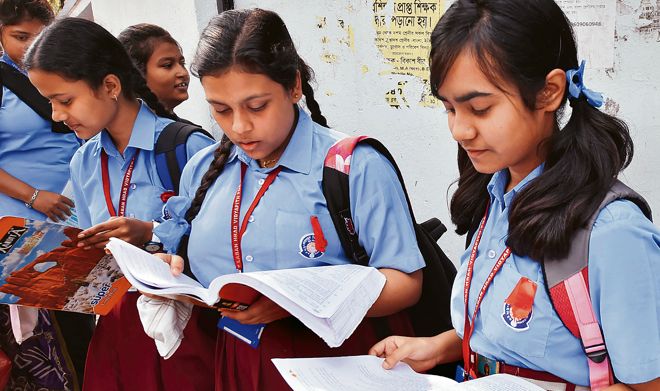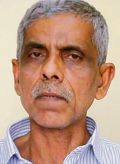
Sociologist
WITH the Board examinations in progress, it’s time to reflect on the meaning of the journey many of our youngsters are undertaking. Yes, in this period of transition, while they are striving for ‘success’ in exams, they know that they would eventually enter the ‘adult’ world, and confront the challenges it poses before them — vocational calling and higher education, or politics and culture. From the ‘protective’ context of family and school to a turbulent world filled with all sorts of perplexities and puzzling sensations, this journey is immensely significant, and possibly, more important than emerging as just ‘topper-securing’ and legitimising the fetish of ‘499/500’ in the Board exam.
At times, I wonder whether schools really prepare our children for this journey. Or, is it that the ritualisation of textbook-centric/exam-oriented learning and sole emphasis on the quantification of bookish knowledge through the ceaseless flow of mock tests and exams has already caused severe psychic and spiritual damage? Is it the story of wounded childhood? Moreover, I am not very sure whether as parents, we really encourage them to acquire the much-required politico-ethical and cultural sensibilities, and retain their quest for a just and humane world. Or, is it that we only ‘invest’ in them, send them to coaching centres and cricket academies and demand appropriate ‘returns’?
To begin with, it is important to acknowledge that the world they are going to enter after the Board exam is not necessarily a very soothing place to live in. As the instrumental logic of techno-capitalism has invaded the domain of higher education, the pursuit of knowledge seems to have lost its ecstasy. In the age of commodification of education as a ‘product’, what matters is the acquisition of the market-driven ‘skills’ and the internalisation of hyper-competitive social Darwinism. In a way, even when some of them would enter the sites of ‘salvation’, high-ranking institutes of technology and management, or fancy private universities, they would realise that nothing has been ‘settled’.
Instead, the race for the mythical ‘success’ has just begun, and it causes psychic violence, promotes suicidal tendencies, intensifies loneliness and disrupts the possibility of unconditional/non-utilitarian relationships. With the pathology of success, life becomes a war zone. And those who would come to public universities would soon realise that with politically appointed vice-chancellors and perpetual attack on the spirit of creatively nuanced critical pedagogy, studentship has lost its charm. It is like finding oneself in a dreamless world filled with either crude pragmatism or utter cynicism.
Furthermore, it would not be wrong to say that the age of violence would confront them. The psychology of narcissism — a distinctive characteristic of the authoritarian personalities ruling the country — fills the socio-cultural landscape with the seeds of violence. As a result, empathy or dialogue disappears and what prevails is the all-pervading fear. Yes, surveillance is normalised, and filing sedition charges against the dissenters becomes the new normal. And nationalism, far from being felt as an enchanting experience of altruistic activities and collective welfare, becomes militant, militaristic and toxic. As it keeps inventing the ‘enemies’ and erects the walls of separation and exclusion, they would feel that all noble ideals have lost their meanings. In a world of this kind, Pragya Singh Thakur matters more than Mahatma Gandhi, and with triumphant Hindutva, the quest for cultural syncretism looks laughable. In other words, here is a world that worships all that is brute, gross and sensational.
What further prevents the ray of illuminating light from entering the interiority of their consciousness is the ‘entertainment industry’ with its dazzling spectacle and media simulation. As the implosion of all boundaries takes place, news becomes boxing, music becomes noise, and the aesthetics of love is lost amid the glitz of pornography. With the instantaneity of consumption, everything becomes a ‘product’, be it a piece of Netflix film, or even a protest march marked by the presence of a Bollywood celebrity. In other words, it is ‘stardom’ that sells. We live amid ‘star’ television anchors, ‘celebrity’ leftists, and ministers with ‘superhuman’ qualities. Amid this magic show, it becomes exceedingly difficult to distinguish the substance from the packaging. Shankaracharya would have described it as maya in this despiritualised era, and Karl Marx would have regarded it as the new opium in these postmodern times.
Well, the culture of sanity requires the cultivation of the meaning of existence, the meaning of what Schumacher would have regarded as ‘good work’ or Erich Fromm would have celebrated as ‘art of loving’. This means quest for a creative and life-affirming engagement with the world. This means connectedness, the rhythm of spiritually enriched, relational and ecological living.
The good thing is that despite the fact that as adults we have betrayed this generation, we see a ray of hope. Greta Thunberg — the Swedish schoolgirl — has aroused our conscience, and made us realise the devastating implications of the risk society and we have created because of our insensitivity to the eco-system. In a way, she has become our tutor in a world otherwise dominated by the likes of Donald Trump.
Furthermore, in recent times, we have witnessed the spirit of courage and idealism among a section of the youth in India. They see education beyond the parameters of ‘placement and salary packages’, take ‘risks’, experience police brutality, and yet remind us of the ideals we have lost in the age of totalitarian politics — the ideals of secularism and cultural pluralism, equity and justice. They are our new tutors.
However, the question remains: as teachers and parents, do I tell these positive stories to our children? Or is it that school principals will continue to be obsessed with the ‘toppers’ and as parents, we will keep pressuring our children to remain ‘safe’ and one-dimensional? Will we negate everything positive as ‘utopian’ and push the youngsters to a dystopian world? We ought to raise this question, even though it would not be asked in the Board exam.
Join Whatsapp Channel of The Tribune for latest updates.




























